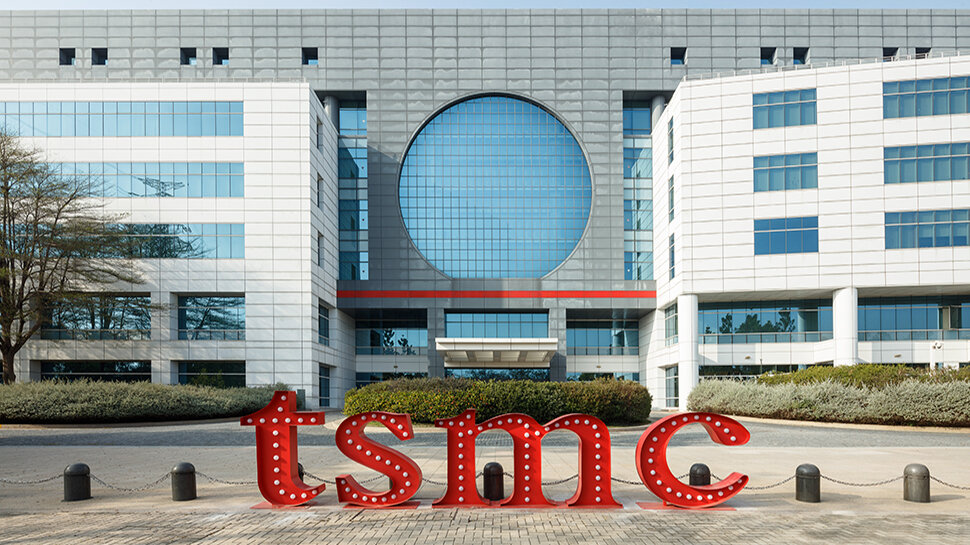Search the Community
Showing results for tags 'tsmc'.
-
TSMC preps 8x reticle size or larger interposers for gargantuan AI and HPC SiPs. View the full article
-
- tsmc
- chipmakers
-
(and 1 more)
Tagged with:
-
Apple chipmaker TSMC has announced plans to produce highly advanced 1.6nm chips that could be destined for future generations of Apple silicon. TSMC yesterday unveiled a series of technologies, including the "A16" process, which is a 1.6nm node. The new technology significantly enhances chip logic density and performance, promising substantial improvements for high-performance computing (HPC) products and data centers. Historically, Apple is among the first companies to adopt new, state-of-the-art chip fabrication technologies. For example, it was the first company to utilize TSMC's 3nm node with the A17 Pro chip in the iPhone 15 Pro and iPhone 15 Pro Max, and Apple is likely to follow suit with the chipmaker's upcoming nodes. Apple's most advanced chip designs have historically appeared in the iPhone before making their way to the iPad and Mac lineups, and ultimately trickling down to the Apple Watch and Apple TV. The A16 technology, which TSMC plans to begin producing in 2026, incorporates innovative nanosheet transistors along with a novel backside power rail solution. This development is expected to provide an 8-10% increase in speed and a 15-20% reduction in power consumption at the same speeds compared to TSMC's N2P process, alongside up to a 1.10x chip density improvement. TSMC also announced the rollout of its System-on-Wafer (SoW) technology, which integrates multiple dies on a single wafer to boost computing power while occupying less space—a development that could be transformative for Apple's data center operations. TSMC's first SoW offering, which is already in production, is based on Integrated Fan-Out (InFO) technology. A more advanced chip-on-wafer version leveraging CoWoS technology is slated for readiness in 2027. TSMC is also making progress toward manufacturing 2nm and 1.4nm chips that are likely destined for future generations of Apple silicon. Its 2nm "N2" node is scheduled for trial production in the second half of 2024 and mass production in late 2025, to be followed by an enhanced "N2P" process in late 2026. Trial production of the 2nm node will begin in the second half of 2024, with small-scale production ramping up in the second quarter of 2025. In 2027, facilities in Taiwan will start to shift toward production of "A14" 1.4nm chips. Apple's upcoming A18 chips for the iPhone 16 lineup are expected to be based on N3E, while the "A19" for the 2025 iPhone models is expected to be Apple's first 2nm chip. The subsequent year, Apple will likely move to an enhanced version of this 2nm node, followed by the newly announced 1.6nm process. Each successive TSMC node surpasses its predecessor in terms of transistor density, performance, and efficiency. Late last year, it emerged that TSMC had already demonstrated prototype 2nm chips to Apple ahead of their expected introduction in 2025.Tags: TSMC, Apple Silicon This article, "Apple Partner TSMC Unveils Advanced 1.6nm Process for 2026 Chips" first appeared on MacRumors.com Discuss this article in our forums View the full article
-
- apple
- apple partners
-
(and 2 more)
Tagged with:
-
Apple chipmaker TSMC is making progress toward manufacturing 2nm and 1.4nm chips that are likely destined for future generations of Apple silicon, DigiTimes reports. The manufacturing time frames for mass production of 2nm and 1.4nm chips have now apparently been determined: Trial production of the 2nm node will begin at in the second half of 2024, with small-scale production ramping up in the second quarter of 2025. Notably, TSMC's new plant in Arizona will also join 2nm production efforts. In 2027, facilities in Taiwan will start to shift toward production of 1.4nm chips. TSMC's first 1.4nm node is officially called "A14" and will follow its "N2" 2nm chips. N2 is scheduled for mass production in late 2025, to be followed by an enhanced "N2P" node in late 2026. Historically, Apple is among the first companies to adopt new, state-of-the-art chip fabrication technologies. For example, it was the first company to utilize TSMC's 3nm node with the A17 Pro chip in the iPhone 15 Pro and iPhone 15 Pro Max, and Apple is likely to follow suit with the chipmaker's upcoming nodes. Apple's most advanced chip designs have historically appeared in the iPhone before making their way to the iPad and Mac lineups. With all of the latest information, here's how the iPhone's chip technology is expected to look going forward: iPhone XR and XS (2018): A12 Bionic (7nm, N7) iPhone 11 lineup (2019): A13 Bionic (7nm, N7P) iPhone 12 lineup (2020): A14 Bionic (5nm, N5) iPhone 13 Pro (2021): A15 Bionic (5nm, N5P) iPhone 14 Pro (2022): A16 Bionic (4nm, N4P) iPhone 15 Pro (2023): A17 Pro (3nm, N3B) iPhone 16 Pro (2024): "A18" (3nm, N3E) "iPhone 17 Pro" (2025): "A19" (2nm, N2) "iPhone 18 Pro" (2026): "A20" (2nm, N2P) "iPhone 19 Pro" (2027): "A21" (1.4nm, A14) The M1 series of Apple silicon chips is based on the A14 Bionic and uses TSMC's N5 node, while the M2 and M3 series use N5P and N3B, respectively. The Apple Watch's S4 and S5 chips use N7, the S6, S7, and S8 chips use N7P, and the latest S9 chip uses N4P. Each successive TSMC node surpasses its predecessor in terms of transistor density, performance, and efficiency. Late last year, it emerged that TSMC had already demonstrated prototype 2nm chips to Apple ahead of their expected introduction in 2025.Tags: TSMC, DigiTimes, Apple Silicon This article, "TSMC's Next-Generation Chip Technology for Apple Silicon on Schedule" first appeared on MacRumors.com Discuss this article in our forums View the full article
-
Although tech giants like Samsung and TSMC currently dominate the silicon landscape, Elon Musk has hinted that Tesla could potentially make its own chips in the future - and while the idea remains a tentative one, it's certainly not beyond the realms of possibility. Tesla spends a fortune on silicon. Its Dojo ExaPod supercomputer boasts a staggering 1.1 exaflops of computing power dedicated to training machine learning models for Tesla's self-driving technology. Musk said in February 2024 that the company will spend "over a billion dollars" on Nvidia and AMD hardware this year just to stay competitive in the AI space. Making its own AI chips would be impossible for Tesla, but it could potentially produce chips for its cars. Currently, Tesla relies on Samsung for the main chips used in its Autopilot feature. Building a chip factory to create processors specifically for that task would be a significant undertaking. Significant, but not impossible. "Tesla could do it..." A recent X exchange between Musk and legendary game developer John Carmack has sparked speculation. Carmack mused about the feasibility of a large tech company creating its own bespoke chips rather than competing with established general-purpose companies. Musk's response? "Tesla could do it, but I sure hope we don’t have to." With growing concerns over the reliance on Korean, Taiwanese and Chinese chipmakers, the possibility of bringing some silicon development in-house is no doubt tempting for Tesla, but the practicalities of such an undertaking mean that without a compelling reason to do so, the company will wisely stick with the status quo for now. As PC Gamer reports, “Nobody in their right mind would want to spend billions of dollars on something that has the distinct potential of not working right for years, when you can just contract a highly experienced and cost-effective business to do it for you.” Tesla could do it, but I sure hope we don’t have toMarch 24, 2024 See more More from TechRadar Pro An unpatchable AMD chip flaw is jailbreaking Tesla carsNvidia is powering a mega Tesla supercomputer powered by 10,000 H100 GPUsAdopting generative AI to drive softwarization of automobiles View the full article
-
The United States Commerce Department today announced a significant financial commitment to Apple chip supplier TSMC to make more chips in the U.S. (via Bloomberg). The White House shared a statement explaining that the U.S. Commerce Department will allocate a $6.6 billion subsidy to TSMC for the advancement of semiconductor production in Phoenix, Arizona. TSMC will also receive $5 billion in loans and be eligible to claim an investment tax credit of up to 25% of capital expenditures. The move is part of a larger initiative under the CHIPS and Science Act, which aims to rejuvenate the United States' semiconductor manufacturing capabilities. TSMC has already committed to an escalated investment of $25 billion, elevating its total investment to $65 billion. This is the largest foreign direct investment in a completely new project in U.S. history. The chipmaker also announced plans to construct a third fabrication plant in Arizona by 2030. The first TSMC plant in Arizona will start producing 4nm chips next year. The second plant, which was originally designed to make 3nm chips, will also make 2nm ones by 2028. The third plant will produce 2nm chips with capacity to make even more advanced semiconductors in the future. Apple's most advanced chips are currently made in Taiwan using TSMC's 3nm process, so the ability to make these chips and even more powerful ones in the future in the United States could represent a significant future shift in the company's supply chain.Tag: TSMC This article, "Apple Chipmaker TSMC to Receive $6.6 Billion Grant to Step Up Production in the U.S." first appeared on MacRumors.com Discuss this article in our forums View the full article
-
On Wednesday, 3 April, the strongest earthquake to strike Taiwan in 25 years killed at least nine people and injured or trapped hundreds more. The 7.4 magnitude quake was followed by more than 200 aftershocks, dozens of which were at least 6.5 magnitude or stronger. Taiwan, which frequently experiences earthquakes due to its position on the Pacific Ring of Fire, produces 80-90% of high-end chips for advanced applications like smartphones and AI. Although the epicenter of the huge quake was on the eastern side of Taiwan, in Hualien County, it was strong enough to be felt in the capital Taipei about 90 miles south. This led to TSMC, the main contract chipmaker for Apple, Nvidia and AMD, evacuating workers and suspending operations. While it was feared this could have severe repercussions for the global smartphone industry, the firm was quick to alleviate concerns. No major damage In a statement issued late on the day of the quake and reported by Bloomberg, TSMC said, “There is no damage to our critical tools, including all of our extreme ultraviolet lithography tools.” A few tools were damaged at some facilities, but nothing to cause any significant delays. It is reported that 70 to 80% of TSMC’s machinery was back online within 10 hours of the earthquake hitting. While TSMC may have got off lightly this time, concerns for the future remain. Tom’s Hardware reports, “The quake came as governments worldwide have considered bringing chip production back home, and worry about consolidating production in a region that is both a potential military hot button and located near two tectonic plates. That's part of why the United States has given massive CHIPS Act subsidies to Intel and others to build and expand domestic fabs. TSMC is also building a U.S. fab in Arizona and is expecting over $5 billion in incentives.” More from TechRadar Pro "Perfect" memory that could replace three types of storage gets prototypeFiber optic cables could detect tsunamis earlyTwo sides of AI in the Industrial Internet of Things View the full article
-
TSMC will resume production overnight following Taiwan's biggest earthquake in 25 years, saying there is no damage to "critical tools." View the full article
-
- tsmc
- chip production
-
(and 1 more)
Tagged with:
-
Forum Statistics
73.8k
Total Topics71.7k
Total Posts
.png.6dd3056f38e93712a18d153891e8e0fc.png.1dbd1e5f05de09e66333e631e3342b83.png.933f4dc78ef5a5d2971934bd41ead8a1.png)








